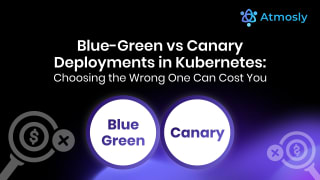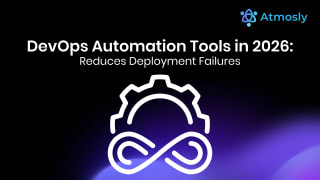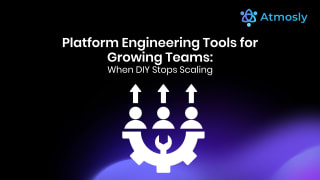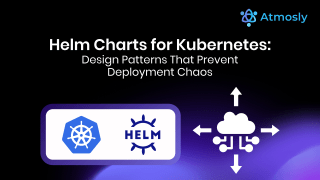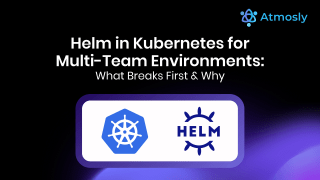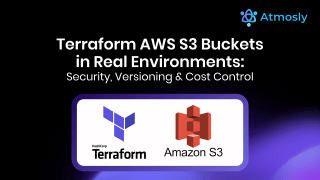In today’s fast-moving digital world, developer time is precious. Yet, many teams still waste hours managing infrastructure, repetitive setups, and manual deployments instead of focusing on innovation. Platform engineering changes that. It creates self-service, automated environments where developers can code, test, and deploy faster without worrying about complex infrastructure.
This blog explores how platform engineering enhances developer productivity, reduces operational overhead, and enables businesses to scale efficiently through automation, Infrastructure as Code (IaC), and modern DevOps practices.
Introduction to Platform Engineering
Platform engineering is not a new concept in terms of what developers have been building for end-consumers or teams creating products for developers, such as Postman and GitHub. However, in recent years, this term has become more associated with teams building platforms for internal use, bridging gaps within organizations.
DevOps emerged to bridge the gap between development (devs) and operations (ops), achieving notable success. However, as technology advanced and new challenges arose, DevOps teams often faced recurring issues. To overcome these challenges, the concept of self-service DevOps platforms or platform engineering is now buzzing in the technology market.
Platform engineering involves designing, building, and managing infrastru no cture and tools for efficient application development and deployment. In simpler terms, it acts as the bridge between software development and IT infrastructure.
The goal of platform engineering is to provide developers with a consistent and reliable environment for developing, testing, and deploying their code. This encompasses everything from hardware resources such as servers and databases to software tools like version control systems, continuous integration/continuous delivery (CI/CD) pipelines, monitoring systems, and more.
Traditionally, these infrastructure tasks were handled by IT operations teams, separate from the development team. However, with the rise of agile methodologies in software development, there has been a shift towards integrating these two teams into one cross-functional unit. Platform engineering facilitates this seamless collaboration, enabling developers and IT operations to jointly build high-quality software at scale.
Why Platform Engineering Is Becoming Essential?
The main goal of platform engineering is to reduce the time and effort required for software development by providing a stable foundation for building applications. This enables developers to concentrate on writing code rather than managing complex infrastructure challenges, leading to faster and higher-quality feature delivery.
Here are some key reasons for its growing importance:
- Increased Demand for Digital Products: The surge in e-commerce, mobile apps, and other digital services compels businesses to continuously innovate and release new features to remain competitive. This demands that developers deliver quickly while upholding high-quality standards.
- Growing Complexity of Systems: The complexity of modern software systems is escalating due to factors like cloud computing, microservices architecture, and big data processing requirements. Platform engineering streamlines this complexity by providing standardized processes and tools, ensuring consistency across applications.
- Need for Scalability: As businesses expand or experience fluctuating demand, their software systems must scale accordingly. Platform engineering facilitates this scalability by ensuring that infrastructure can handle increased loads without compromising performance or reliability. This adaptability is crucial for businesses to respond to market changes and customer demands efficiently.
- Enhancing Collaboration and Efficiency: By bridging the gap between development and operations teams, platform engineering fosters a more collaborative and efficient environment. This integration results in fewer silos, better communication, and a more cohesive approach to software development and deployment.
- Emphasis on Automation and Continuous Improvement: Platform engineering often incorporates automation in building, testing, and deploying applications, which significantly reduces manual errors and speeds up the development process. This continuous integration and delivery model enables teams to iterate rapidly and respond to feedback more effectively.
Benefits of Platform Engineering for Developers

Platform engineering is a crucial aspect of software development that focuses on building and maintaining the underlying infrastructure that supports a software platform. It involves creating a stable, scalable, and secure foundation for developers to build upon and deliver high-quality products efficiently. In this section, we will delve deeper into the benefits of platform engineering for developers.
Increased Productivity
Platform engineering is a rapidly growing field that focuses on creating and managing platforms for software development. These platforms provide a centralized, streamlined environment for developers to work in, allowing them to increase productivity and reduce business costs. In this section, we will delve into the ways in which platform engineering can help increase developers' productivity.
- Standardized Infrastructure:
One of the key benefits of platform engineering is the creation of standardized infrastructure for development teams. This means that all developers are working with the same tools, frameworks, and environments, eliminating any inconsistencies or compatibility issues. With a unified infrastructure in place, developers can spend less time troubleshooting technical problems and more time actually coding and developing new features. - Automation:
Platform engineering also involves implementing automation processes throughout the software development lifecycle. This includes automated testing, deployment pipelines, and continuous integration/continuous delivery (CI/CD) practices. By automating repetitive tasks such as testing and deployment, developers can focus their time and energy on more complex tasks that require their expertise. This not only improves productivity but also ensures higher quality code with fewer errors. - Collaboration:
Another crucial aspect of platform engineering is fostering collaboration among team members. With a centralized platform in place, developers can easily share code, collaborate on projects, and communicate effectively without having to switch between different tools or systems. This streamlines communication and promotes teamwork among developers which ultimately leads to increased productivity. - Scalability: Platform engineering facilitates rapid scalability, enabling teams to efficiently adjust resources to meet fluctuating project demands. This adaptability is vital in fast-paced markets, allowing for seamless scaling in response to business growth or changing requirements. By simplifying resource management, platform engineering ensures consistent developer productivity, even as project scopes evolve, freeing developers to concentrate on innovation and problem-solving instead of infrastructure concerns.
Lower Business Costs:
One of the most significant benefits of platform engineering is its ability to lower business costs. By streamlining development processes and improving efficiency, businesses can save time and money in various areas. Here are some ways in which platform engineering helps reduce business costs:
- Faster Time-to-Market:
With traditional software development methods, it can take months or even years to develop a product and release it into the market. However, with platform engineering, developers can create a functional minimum viable product (MVP) quickly, allowing businesses to get their products to market faster. This reduced time-to-market results in cost savings for the business as they can start generating revenue from their product sooner. - Reduced Maintenance Costs:
Platform engineering emphasizes creating reusable components that can be used across multiple applications and projects. It reduces the need for maintaining separate codebases for each application, resulting in significant cost savings on maintenance efforts. Additionally, by using standardized components and frameworks, developers spend less time troubleshooting issues, further reducing maintenance costs. - Efficient Resource Management:
Platform engineering allows for efficient resource management by automating repetitive tasks and optimizing resources like servers, databases, etc., based on demand. With automated resource allocation and usage monitoring tools, businesses can avoid unnecessary expenses on underutilized resources while ensuring optimal performance. - Cost-Effective Scalability:
Scalability is crucial for any growing business or application. Traditional software development methods often require significant investments when scaling up an application’s infrastructure or adding new features
Streamlined Processes : are an essential component of platform engineering that can greatly impact the productivity of developers and ultimately lower business costs. Businesses need to adapt quickly to changing market demands and customer needs. This requires a high level of efficiency in developing, deploying, and managing software applications. Best Example is SAAS product which might require new deployment to on-board new customer which can be streamlined to deliver within hours rather then days or weeks.
Key Components of Platform Engineering
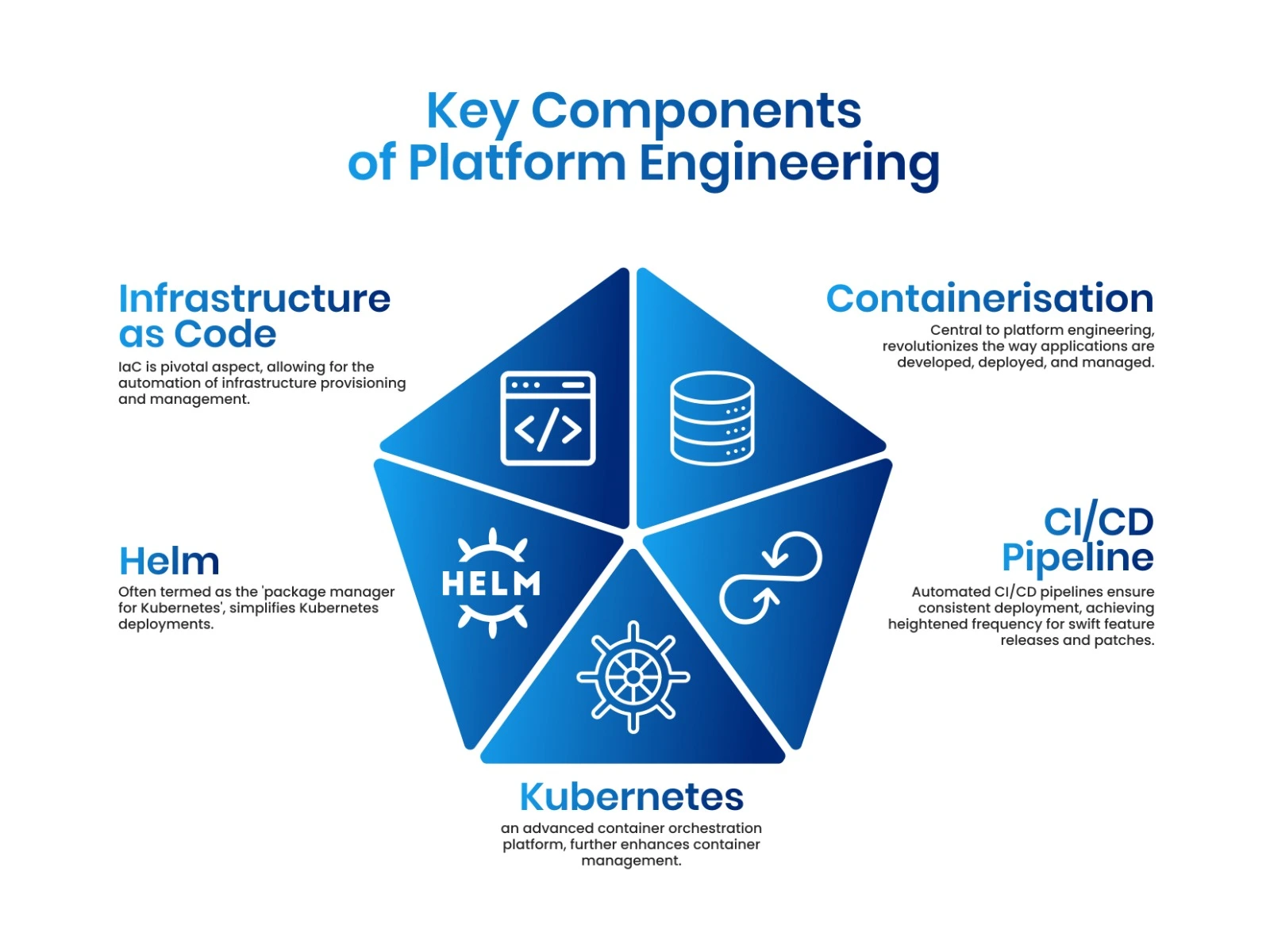
- Infrastructure as Code (IaC): is pivotal aspect, allowing for the automation of infrastructure provisioning and management. Tools like Terraform and Cloudformation enable developers to define infrastructure using code, making it easy to create, modify, and share infrastructure safely and efficiently. IaC integrates seamlessly with containerisation and orchestration tools, creating a cohesive and automated environment for platform engineering. This approach ensures that infrastructure provisioning is as agile and manageable as application development, reinforcing the principles of speed, scalability, and reliability.
- Containerisation : central to platform engineering, revolutionizes the way applications are developed, deployed, and managed. By encapsulating an application and its dependencies in a container, it ensures consistency across different environments.
- Docker: is a pivotal tool in this domain, enabling developers to easily create, deploy, and run applications in containers. It streamlines the process of packaging an application with all its dependencies into a single container, which can then be run on any system that supports Docker. This simplifies development and testing, ensuring that applications work seamlessly in any environment.
- Kubernetes : an advanced container orchestration platform, further enhances container management. It automates the deployment, scaling, and operation of containerized applications, efficiently managing clusters of containers across multiple hosts. Kubernetes' ability to orchestrate complex container setups makes it indispensable for modern cloud-native applications.
- Helm: often termed as the 'package manager for Kubernetes', simplifies Kubernetes deployments. It allows developers to define, install, and upgrade even the most complex Kubernetes applications. Helm charts help manage Kubernetes applications through easy-to-understand configuration files, streamlining the deployment process and ensuring consistent deployments across different environments.
Challenges & Solution in Adopting Platform Engineering
| Feature | Challenges in Platform Engineering | How Atmosly Addresses the Challenges |
|---|---|---|
| Integration Tools | Complexity of integrating diverse tools and practices. | Unified platform for seamless integration with existing systems and tools. |
| Collaboration and Culture | Shifting organizational culture to more collaborative practices. | Features that enhance teamwork and agile practices, aiding cultural transition. |
| Security and Compliance | Ensuring security and compliance in automated environments. | Automated security checks and compliance monitoring within the development lifecycle. |
| Resource and Cost Management | Managing resources efficiently in scalable environments. | Advanced tools for real-time resource management and cost optimization. |
| Education and Training | Addressing skill gaps in new technologies and methodologies. | Comprehensive training resources for upskilling in platform engineering. |
| Technology Adaptation | Keeping pace with rapid technology changes. | Regular updates and integration of the latest technological advancements. |
| Quality and Speed | Maintaining high-quality standards while accelerating development. | Automated testing and CI/CD pipelines to balance speed with quality. |
Future Outlook and Trends in Platform Engineering
The field of platform engineering is rapidly evolving, driven by technological advancements and changing business needs as indicated by the 2023 Platform Engineering survey and Gartner's insights.

Here's a look at the key trends and future outlook in this domain:
Increased Emphasis on Automation and AI:
- Future platform engineering will likely see more extensive use of automation, powered by Artificial Intelligence (AI) and Machine Learning (ML). These technologies will enable even smarter automation of development and operational tasks, reducing manual effort and improving efficiency.
Growth of Serverless Architectures:
- Serverless computing, where cloud providers dynamically manage the allocation of machine resources, is expected to gain more traction. This shift will further simplify infrastructure management, allowing developers to focus purely on code.
Rise of Edge Computing:
- With the growth of IoT and the need for faster processing, edge computing will become more integral in platform engineering. This involves processing data closer to where it's generDevSecOpsated, reducing latency and bandwidth use.
Enhanced Focus on Security (DevSecOps):
- Security will continue to be a top priority, leading to the further integration of security practices into the DevOps pipeline (DevSecOps). This will ensure continuous security monitoring and compliance throughout the software development lifecycle.
Multi-Cloud and Hybrid Cloud Strategies:
- The adoption of multi-cloud and hybrid cloud approaches will increase, allowing businesses more flexibility in their cloud strategies and avoiding vendor lock-in.
Greater Adoption of Microservices and Containers:
- The trend towards microservices architecture and containerization (using tools like Kubernetes and Docker) will continue to grow, providing more agility and scalability in application development and deployment.
Expansion of Infrastructure as Code (IaC):
- IaC will become more prevalent as it provides a more efficient way of managing infrastructure with the benefits of version control and documentation.
Enhanced Observability and Monitoring:
- Observability will become more critical in platform engineering, enabling teams to monitor applications more effectively and understand the deeper context behind data and trends.
Conclusion
Platform engineering is rapidly becoming the backbone of modern software development. By combining automation, standardized infrastructure, and self-service tools, it empowers developers to focus on innovation rather than repetitive operational tasks. This shift not only enhances developer productivity but also improves software quality, accelerates delivery cycles, and reduces business costs.
As organizations continue to adopt cloud-native architectures and DevOps practices, platform engineering provides the foundation for scalability, collaboration, and long-term agility. By investing in robust internal developer platforms and automation-first strategies, businesses can unlock faster time-to-market and a stronger competitive edge.
With solutions like Atmosly, teams can easily implement platform engineering best practices streamlining CI/CD, observability, and infrastructure management across any environment. In the end, the path to true developer productivity lies in building platforms that simplify complexity, enable autonomy, and drive continuous innovation.
Boost developer productivity with Atmosly.
Leverage Atmosly’s unified platform engineering tools for automation, observability, and faster software delivery.

